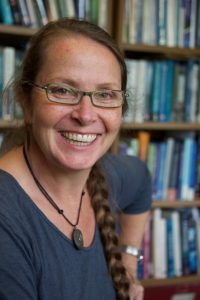Jean D. MacRae, Ph.D.
Associate Professor 
315A Boardman Hall
University of Maine
Orono, Maine 04469-5711
Phone: 207.581.2137
Fax: 207.581.3888
Email: Jean.MacRae@maine.edu
Education:
Ph.D. in Civil Engineering
University of British Columbia Vancouver, B.C., Canada, 1997.
M.S. in Microbiology
University of British Columbia Vancouver, B.C., 1991.
B.S. in Life Sciences
Queen’s University, Kingston, Ontario, Canada, 1988.
Courses:
CIE 331 Fundamentals of Environmental Engineering
CIE 434 Wastewater Process Design
CIE 439 Air Pollution and Solid Waste
CIE 534 Environmental Microbiology
CIE 537 Water Pollution
CIE 598 Biological Processes
Research Interest:
Dr. MacRae’s research interests include microbial processes that affect pollutant and nutrient cycling, sustainability issues and access to water and sanitation in the developing world.
She is affiliated with the Maine Center for Genetics in the Environment, and the Senator George J. Mitchell Center for Sustainability Solutions, where she is part of two research teams working on PFAS contamination and Materials Management.
Current Research:
Materials management. All of our materials should be managed in a way that allows us to
gain the maximum use from materials, and recycle them safely once we are finished with
a product – in other words, we should have circular material systems. The interactions
between materials during production, use and disposal, however, can make them difficult
or impossible to recover in a form that is safe for reuse. Interests in this area include:
identifying and managing the risks associated with a circular food system; managing
materials contaminated with PFAS (“forever chemicals”) and other emerging
contaminants; management and processing of other organic wastes for energy and
nutrient recovery.
Aquaculture waste management. Aquaculture provides an increasingly large share of the
world’s protein. Interests in this area include: reducing the environmental impacts of
aquaculture; nutrient recovery and energy from its waste; and treatment to improve fish
health and quality.
Biogeochemical cycling. All life on Earth depends on biogeochemical cycles to maintain
the availability of cellular building blocks. Research interests in this area include:
nitrogen cycling in soil and water; arsenic transformations; the processes behind acid
rock drainage and material corrosion.
Development of field tests for microbes in the environment. Reliable, rapid and
inexpensive microbial field test methods are needed for many applications, from
assessment of the safety and integrity of drinking water sources, to monitoring
recreational areas. Interest in this area include development of work flows for rapid
assessment of fecal indicators; development of detection methods for pathogens and
harmful algal species.
Adsorption of As to a variety of adsorbents. Arsenic contamination of drinking water is a problem in Maine and many other parts of the world: most notably in the Bangladesh and West Bengal. Students have been studying low cost adsorbents under various test conditions to determine their effectiveness for arsenic removal from drinking water.
Sustainable water and wastewater systems for the developing world. Dr. MacRae is also faculty advisor of the UMaine chapter of Engineers Without Borders (EWB), an organization dedicated to improving quality of life in the developing world through the implementation of sustainable, community-driven engineering projects. This group has completed a community sanitation system for the community of Dulce Vivir de
Copán, Honduras, and a rainwater catchment system in El Descanso, Ecuador.
